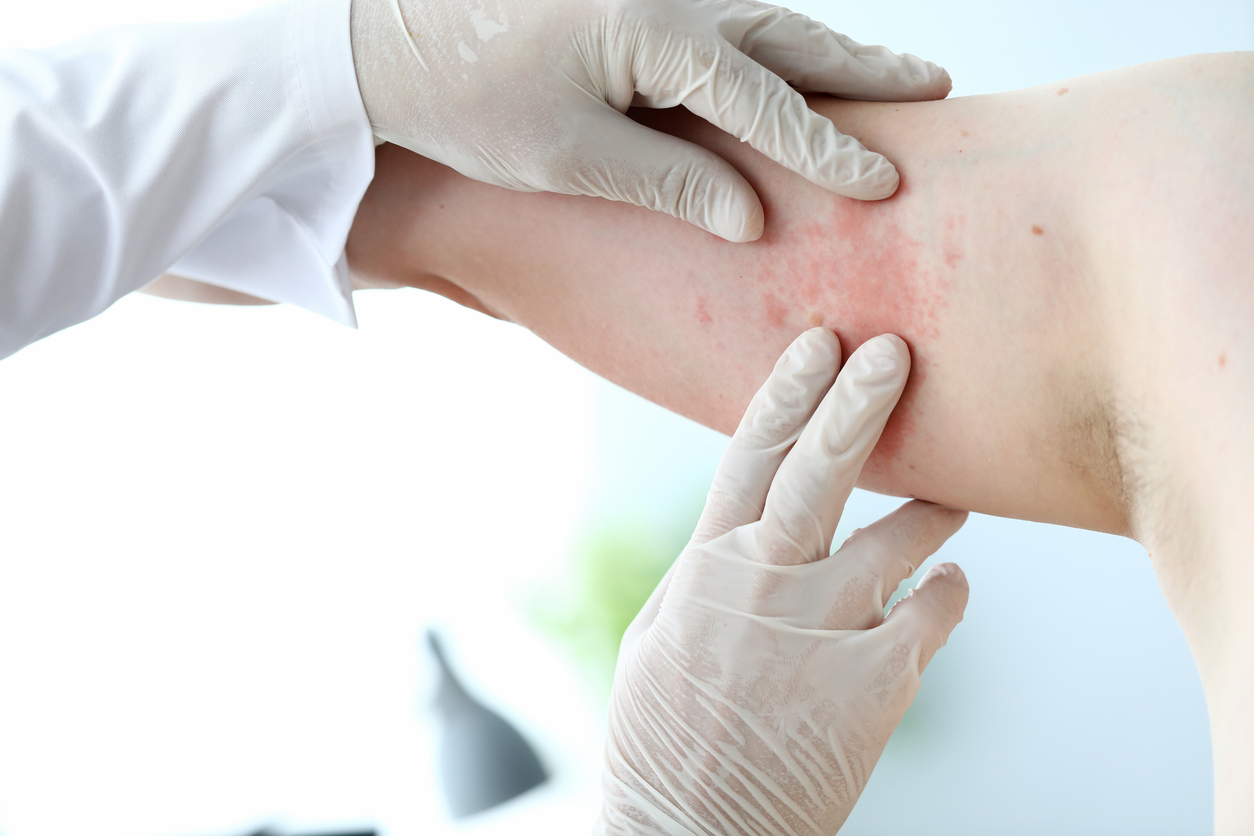The Latest Healthcare News
Check out our blog to learn more from our team about the latest medical advancements, health tips, and primary care news.

At AllCare, we understand the importance of healthy skin as it is our body’s first line of defense against germs and infections. When the skin is compromised, it becomes vulnerable to bacteria that can cause pain, swelling, and other complications. Our dedicated team is committed to providing thorough evaluation and effective treatment for minor skin infections.
While a skin rash may be a symptom of a skin infection, not everyone who has a rash has a skin infection. Rashes are often red, itchy, or irritated patches of skin, while skin infections may have signs of pus or fluid leaking from a wound, pain, swelling, or skin discoloration. While many skin infections are minor, the AllCare team can help diagnose the severity of your symptoms and offer a treatment plan that’s right for you.

At AllCare, we treat a wide range of skin infections to ensure your health and well-being. Our experienced team is equipped to diagnose and manage various conditions, including:

AllCare offers a variety of tests to determine the specific cause of your skin infection. Our doctors will ask when and how your symptoms started. Then, they’ll perform a physical exam of the area. If there is pus or fluid draining from the area, they may send a sample for further analysis to determine if there’s an infection and what type it may be to guide the appropriate treatment.

We provide medication management of oral and topical antibiotics to treat bacterial skin infections. Fungal infections like athlete’s foot, jock itch, and ringworm may require antifungal medications.

If your skin infection developed an abscess, we will evaluate the severity and determine the appropriate course of action. Most abscesses can be drained in a simple office procedure, but others may require a different type of specialist, such as an ER doctor or a surgeon.

Depending on the severity of your skin condition or infection, the AllCare team may schedule a follow-up evaluation. In more complex cases, we may refer you to a dermatologist to prevent future occurrences.

Experience the convenience of telehealth appointments at AllCare. Our telemedicine services are designed to provide you with seamless access to healthcare without the need to leave your home. Whether you need an online doctor’s appointment for immediate or primary care, AllCare’s got you covered. With our online telehealth services currently available to individuals located in Virginia, Maryland, and Washington, D.C., you can connect with our experienced immediate and primary care physicians via secure video calls.
At AllCare, we are expanding our virtual healthcare access to all services previously offered in person. This includes:
A skin infection can present with various symptoms, depending on the type and severity of the lesion or wound. Early diagnosis and treatment can prevent the infection from spreading and becoming serious. Here are some common signs and symptoms to look out for:
You can easily get a consultation for your skin infection by scheduling your appointment at AllCare or by simply walking into one of our clinics. Follow these simple steps:
Skin infections are caused by a variety of microorganisms, including viruses, bacteria, fungi, and parasites. Each type of microorganism can enter the skin through different means, such as cuts, scrapes, bug bites, piercings, tattoos, or wounds. The symptoms and treatment will depend on the specific cause of the infection. Bacterial infections like cellulitis and impetigo are treated with antibiotics, while fungal infections like athlete’s foot and ringworm require antifungal medications. Viral infections, such as shingles, are managed with antiviral drugs, and parasitic infections, like scabies, are treated with antiparasitic medications.
There are multiple forms of skin infection and understanding the different types can ensure you receive early intervention. The most common types of skin infections include:
Certain individuals are at higher risk for skin infections due to existing diseases and chronic illnesses. Conditions like diabetes, poor circulation, obesity, and a weakened immune system increase susceptibility to infections. Individuals with immunocompromised diseases such as HIV or those undergoing chemotherapy are also at higher risk.
Additionally, very young children and elderly individuals, as well as those with chronic skin conditions like eczema, are more prone to developing skin infections. Factors like poor hygiene, frequent skin injuries, and living in close quarters with others can also contribute to a higher risk.
Good personal hygiene is the first step to preventing skin infections. Washing your hands with soap and water regularly can help prevent the spread of bacteria. Keep your skin clean and dry, and don’t scratch the affected areas, which could worsen the infection. For fungal infections, avoid walking barefoot in public, and choose socks and shoes made of breathable fabric.
At AllCare, we’re proud to deliver exceptional primary and immediate care to residents across Virginia, Maryland, and Washington D.C. From bustling city centers to serene suburban neighborhoods, our clinics are strategically placed for your convenience and care. Experience top-tier skin infection treatment in your community with AllCare, where your health is our priority.
Check out our blog to learn more from our team about the latest medical advancements, health tips, and primary care news.
Seasonal Affective Disorder (SAD) represents a significant mental health concern affecting approximately 5% of adults in the United States. This […]
Read More >Mammograms save lives. Early detection of breast cancer through proper screening will give a patient a remarkable 99% five-year survival […]
Read More >Most people are aware that diet, exercise, and genetics affect cholesterol levels. But can stress raise your cholesterol? The answer […]
Read More >Our related healthcare services extend beyond immediate care to include preventive care such as routine physical exams, chronic disease management for conditions like diabetes, and specialty care referrals for more complex health issues.